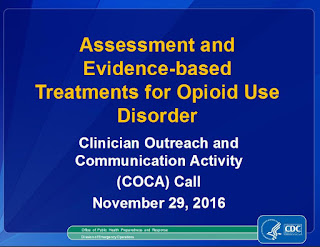#11,955
Later today the CDC will hold a COCA call for clinicians on the Assessment and Evidence-based treatments for Opioid Use Disorder.
Although primarily of interest to clinicians, the CDC holds frequent COCA (Clinician Outreach Communication Activity) calls which are designed to ensure that practitioners have up-to-date information for their practices.
Recorded materials from earlier COCA calls may be accessed at this link. For those unable to attend this live presentation, it ought to be archived on the website within a few days.
This is the fifth webinar in a COCA Call series about CDC Guideline for Prescribing Opioids for Chronic Pain. To view a list of other webinars in the series, visit the opioid call series overview webpage
Date:Tuesday, November 29, 2016
Time: 2:00-3:00 pm (Eastern Time)
Call-In:
1-800-779-0686 (U.S.Callers)
1-312-470-0194 (International Callers)
Passcode: 3377346 Webinar:https://www.mymeetings.com/nc/join.php?i=PW1897448&p=3377346&t=c
Presenter(s)
Deborah Dowell, MD, MPH
Senior Medical Advisor
Division of Unintentional Injury Prevention
National Center for Injury Control and Prevention
Centers for Disease Control and Prevention
Joseph O. Merrill, MD, MPH
Associate Professor
Department of Medicine
University of Washington
Harborview Medical Center
Mark Sullivan, MD, PhD
Professor
Psychiatry and Behavioral Sciences
Anesthesiology and Pain Medicine
Bioethics and Humanities
University of Washington
Overview
One substantial risk associated with prescribing opioids for chronic pain is opioid use disorder (OUD). This disorder is associated with specific criteria, such as unsuccessful efforts to cut down or control opioid use, as well as use resulting in social problems and a failure to fulfill obligations at work, school, or home. During this COCA Call, clinicians will learn about OUD diagnosis criteria, evidence-based treatment options, and patient education techniques. Presenters will use actual case studies to illustrate how clinicians can use recommendations from the CDC Guideline for Prescribing Opioids for Chronic Pain to select OUD evidence-based treatment options such as medication-assisted treatment with buprenorphine or methadone in combination with behavioral therapies.
Objectives
- Describe Diagnostic and Statistical Manual of Mental Disorders, Fifth Edition (DSM-5) assessment criteria for opioid use disorder.
- Discuss the evidence for opioid use disorder medication-assisted treatment.
- List types of medications and settings used in medication-assisted therapy.
- Review considerations for buprenorphine, methadone, and naltrexone use for opioid use disorder.
- Outline the opioid taper process used when opioid harms exceed opioid benefits but opioid use disorder DSM-5 criteria are not met.
Call Materials
- Slides: Read Now

 =
=